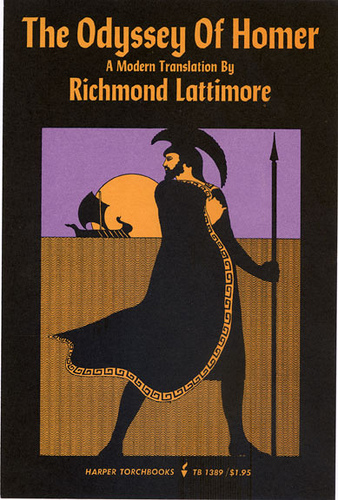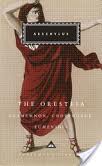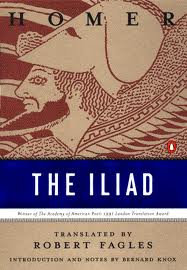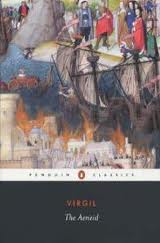This list reflects the rankings of all 174 lists published as of October 1, 2022. The top ten books remain the same, though their order has shifted since the original rankings published in the book (see below): The Iliad and Arabian Nights are up and the Aeneid is down. That is all.
 1. The Odyssey by Homer (ninth century b.c.e.?). Where The Iliad tells of war, The Odyssey is the story of survival and reconciliation following the ten-year battle with Troy. Where Achilles was defined by warrior brutality, Odysseus, King of Ithaca, is defined by his intelligence and wit. This epic poem follows Odysseus on his adventures as he struggles —against the threats of sea monsters and the temptation of the sirens’ song —to be reunited with his son Telemachus, his faithful, clever queen Penelope, and their kingdom.
1. The Odyssey by Homer (ninth century b.c.e.?). Where The Iliad tells of war, The Odyssey is the story of survival and reconciliation following the ten-year battle with Troy. Where Achilles was defined by warrior brutality, Odysseus, King of Ithaca, is defined by his intelligence and wit. This epic poem follows Odysseus on his adventures as he struggles —against the threats of sea monsters and the temptation of the sirens’ song —to be reunited with his son Telemachus, his faithful, clever queen Penelope, and their kingdom.
 2. The Divine Comedy by Dante Alighieri (1321). Dante’s poetic trilogy traces the journey of a man’s soul from darkness (The Inferno) to the revelation of divine light (Paradiso) while providing commentary and gossip about the politics and prominent families of Florence. Led in his pilgrimage through the underworld and purgatory by the Greek poet, Virgil, Dante is escorted into paradise by his early beloved, Beatrice, while learning that, in order to ascend, he must be transformed.
2. The Divine Comedy by Dante Alighieri (1321). Dante’s poetic trilogy traces the journey of a man’s soul from darkness (The Inferno) to the revelation of divine light (Paradiso) while providing commentary and gossip about the politics and prominent families of Florence. Led in his pilgrimage through the underworld and purgatory by the Greek poet, Virgil, Dante is escorted into paradise by his early beloved, Beatrice, while learning that, in order to ascend, he must be transformed.
 3. The Bible. (See below.)
3. The Bible. (See below.)
 4. The Canterbury Tales by Geoffrey Chaucer (1380s?). Not so much a single poem as a gathering of voices ranging from bawdy to pious, this captivating work presents a panoramic view of medieval England. Vivid, direct, and often irresistibly funny, the tales are told by pilgrims making their way to Canterbury to visit the shrine of Saint Thomas Beckett. Each night another member of the party —a knight, a scholar, a miller —tells a story, and tale by tale, a portrait emerges of the diversity and delight of human possibility.
4. The Canterbury Tales by Geoffrey Chaucer (1380s?). Not so much a single poem as a gathering of voices ranging from bawdy to pious, this captivating work presents a panoramic view of medieval England. Vivid, direct, and often irresistibly funny, the tales are told by pilgrims making their way to Canterbury to visit the shrine of Saint Thomas Beckett. Each night another member of the party —a knight, a scholar, a miller —tells a story, and tale by tale, a portrait emerges of the diversity and delight of human possibility.
 5. The Oresteia by Aeschylus (458 b.c.e.). Before Freud, there was Aeschylus, who revealed the mind’s darkest impulses through this trilogy of plays mapping the mad round of retaliations that bring down the royal house of Atreus. In the first play, the Greek King Agamemnon — who sacrificed his daughter Iphigenia to appease the gods before setting sail for the Trojan War — and his slave, Cassandra, are slain by his wife, Clytemnestra. In the second play, Clytemnestra is slain by her son, Orestes (egged on by his sister Electra to avenge their father’s murder). In the final play, Orestes is freed from the Furies (or the curse) because, unlike the other characters — who search for scapegoats — he admits his own culpability, ending the cycle of violence through personal responsibility.
5. The Oresteia by Aeschylus (458 b.c.e.). Before Freud, there was Aeschylus, who revealed the mind’s darkest impulses through this trilogy of plays mapping the mad round of retaliations that bring down the royal house of Atreus. In the first play, the Greek King Agamemnon — who sacrificed his daughter Iphigenia to appease the gods before setting sail for the Trojan War — and his slave, Cassandra, are slain by his wife, Clytemnestra. In the second play, Clytemnestra is slain by her son, Orestes (egged on by his sister Electra to avenge their father’s murder). In the final play, Orestes is freed from the Furies (or the curse) because, unlike the other characters — who search for scapegoats — he admits his own culpability, ending the cycle of violence through personal responsibility.
 6. The Iliad by Homer (ninth century b.c.e.?). The glory and horror of war pulse through this epic poem about the thousand ships launched in battle after the Trojan prince Paris abducts the beautiful Helen from her husband Menelaus, the King of Sparta. Through exquisite language Homer tells of capricious Greek gods and goddesses, fealty and honor between friends, and the terror of war. While crafting mythical tales, he creates an array of legendary heroes, especially Achilles, whose pride is as vulnerable as his heel.
6. The Iliad by Homer (ninth century b.c.e.?). The glory and horror of war pulse through this epic poem about the thousand ships launched in battle after the Trojan prince Paris abducts the beautiful Helen from her husband Menelaus, the King of Sparta. Through exquisite language Homer tells of capricious Greek gods and goddesses, fealty and honor between friends, and the terror of war. While crafting mythical tales, he creates an array of legendary heroes, especially Achilles, whose pride is as vulnerable as his heel.
 7. The Arabian Nights: Tales from a Thousand and One Nights (c. 1450). Scheherazade receives the grim honor of marrying her King, who executes his wives on the day after the wedding night. Sche herazade delays her death by at least one thousand nights by telling tales that grow out of each other like the designs in a Turkish rug. Those childhood familiars, Sindbad, Ali Babba, and Aladdin, are all here.
7. The Arabian Nights: Tales from a Thousand and One Nights (c. 1450). Scheherazade receives the grim honor of marrying her King, who executes his wives on the day after the wedding night. Sche herazade delays her death by at least one thousand nights by telling tales that grow out of each other like the designs in a Turkish rug. Those childhood familiars, Sindbad, Ali Babba, and Aladdin, are all here.
 8. The Decameron by Giovanni Boccaccio (1351–53). The Big Chill meets the Black Death when a group of seven women and three men leave Florence to escape the plague of 1348. To entertain themselves, they tell stories according to topics selected by that day’s appointed “king” or “queen.” Like the plague, the hundred tales, mostly of love and deceit, leave no strata of society unscathed, and many of them are delightfully bawdy and irreverent. Have you heard the one about the monk who seduced a woman by claiming to be the angel Gabriel?
8. The Decameron by Giovanni Boccaccio (1351–53). The Big Chill meets the Black Death when a group of seven women and three men leave Florence to escape the plague of 1348. To entertain themselves, they tell stories according to topics selected by that day’s appointed “king” or “queen.” Like the plague, the hundred tales, mostly of love and deceit, leave no strata of society unscathed, and many of them are delightfully bawdy and irreverent. Have you heard the one about the monk who seduced a woman by claiming to be the angel Gabriel?
 9. The Aeneid by Virgil (19 b.c.e.). Like Achilles and Odysseus before him, Aeneas makes sacrifices for friendship and descends into the world of the dead, but he never finds peace or a true home. Aeneas does find support and love from the Queen of Carthage, Dido, but he flees in the night, abandoning her to suicide, overthrowing comfort and home to remain true to his quest (and the spell of the gods) to found the city of Rome.
9. The Aeneid by Virgil (19 b.c.e.). Like Achilles and Odysseus before him, Aeneas makes sacrifices for friendship and descends into the world of the dead, but he never finds peace or a true home. Aeneas does find support and love from the Queen of Carthage, Dido, but he flees in the night, abandoning her to suicide, overthrowing comfort and home to remain true to his quest (and the spell of the gods) to found the city of Rome.
 10. The Oedipus trilogy by Sophocles (496–406 b.c.e.). Like an existential sadist, Sophocles explores the tragic complexities of fate by hurling his characters into situations in which they are simultaneously guilty and innocent, forced to choose between right and right or wrong and wrong —or some painfully imprecise combination of the two. In Oedipus the King, Oedipus is desperate to escape his fate —that he will murder his father and marry his mother —yet inexorably fulfills it with devastating effect. In Oedipus at Colonus, the blind, self-exiled ruler moves toward faith and goodness as his sons battle for his throne. In the third play, Antigone, his loving and upright daughter is forced to choose with climactic consequence between equally worthy goals as Sophocles depicts our struggles to explain a world we can scarcely comprehend.
10. The Oedipus trilogy by Sophocles (496–406 b.c.e.). Like an existential sadist, Sophocles explores the tragic complexities of fate by hurling his characters into situations in which they are simultaneously guilty and innocent, forced to choose between right and right or wrong and wrong —or some painfully imprecise combination of the two. In Oedipus the King, Oedipus is desperate to escape his fate —that he will murder his father and marry his mother —yet inexorably fulfills it with devastating effect. In Oedipus at Colonus, the blind, self-exiled ruler moves toward faith and goodness as his sons battle for his throne. In the third play, Antigone, his loving and upright daughter is forced to choose with climactic consequence between equally worthy goals as Sophocles depicts our struggles to explain a world we can scarcely comprehend.
Appreciation of the Bible by Andrew Hudgins
The Bible is both a holy book and a work of supreme fiction; those of us who read it both ways are doubly blessed. One does not need to believe in God to hear the majesty of the story that begins, “In the beginning, God created the heaven and the earth. And the earth was without form, and void; and darkness was upon the face of the deep. And the Spirit of God moved upon the face of the waters. And God said, Let there be light: and there was light.” A great story itself, the Bible is also the source of great stories, by geniuses from Dante to Dostoevsky, Faulkner to Thomas Mann, and the poetry of the Psalms echoes through great poetry from William Blake to Walt Whitman to T. S. Eliot.
One does not have to believe Jesus is the Son of God to understand that his parables are penetrating works of fiction that embody complex truths about human nature. One need not believe Adam and Eve existed to see Genesis is, whatever else it is, a philosophically sophisticated and psychologically acute story about people’s innate response to authority, even loving authority. And it is perfectly possible to believe Moses and King David are fictional, and yet find true to life the Bible’s stories of these flawed men who succeed greatly, if only partially, while failing God time and again.
And what of Jesus —a god entering history as a man and living as a mortal? True or not true, “the greatest story ever told,” in the majesty of its telling and the power of its message, has taught an entire culture how to think about love, suffering, and transcendence, and it has fundamentally colored the language by which we talk about everything.
Top Ten Books up to the 15th Century from the Published Book
1. The Odyssey by Homer (ninth century b.c.e.?)
2. The Divine Comedy by Dante Alighieri (1321)
3. The Bible
4. The Canterbury Tales by Geoffrey Chaucer (1380s?)
5. The Oresteia by Aeschylus (458 b.c.e.)
6. The Aeneid by Virgil (19 b.c.e.)
7. The Iliad by Homer (ninth century b.c.e.?)
8. The Decameron by Giovanni Boccaccio (1351–53)
9. The Arabian Nights: Tales from a Thousand and One Nights (c. 1450)
10. The Oedipus trilogy by Sophocles (496–406 b.c.e.)